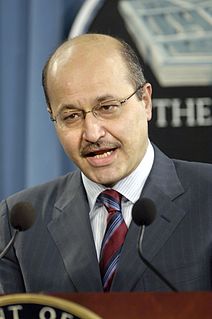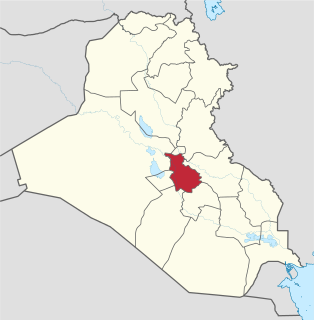The politics of Iraq take place in a framework of a federal parliamentary representative democratic republic. It is a multi-party system whereby the executive power is exercised by the Prime Minister of the Council of Ministers as the head of government, as well as the President of Iraq, and legislative power is vested in the Council of Representatives and the Federation Council.

Elections for the National Assembly of Iraq were held on January 30, 2005 in Iraq. The 275-member National Assembly was a parliament created under the Transitional Law during the Occupation of Iraq. The newly elected transitional Assembly was given a mandate to write the new and permanent Constitution of Iraq and exercised legislative functions until the new Constitution came into effect, and resulted in the formation of the Iraqi Transitional Government.

The Council of Representatives is the unicameral legislature of the Republic of Iraq. It is currently composed of 329 seats and meets in Baghdad inside the Green Zone.

Following the ratification of the Constitution of Iraq on 15 October 2005, a general election was held on 15 December to elect a permanent 275-member Iraqi Council of Representatives.
Mithal Jamal Hussein Ahmad al-Alusi is an Iraqi politician and the leader of the Iraqi Ummah Party. He was elected to the Iraqi Council of Representatives as an independent in the December 2005 election and was once again elected in the 2014 Iraqi parliamentary election as part of the Civil Democratic Alliance which is an Iraqi political coalition formed by various liberal and civil figures and his party one seat, represented by himself. He arrived fifth place in Baghdad out of seventy-one seats. He is a Sunni Muslim Arab politician and supports a close alliance with the United States of America, the United Kingdom, Turkey and Israel.
The Ninawa campaign was a series of offensives and counter-attacks between insurgent and Coalition forces for control of the Ninawa Governorate in northern Iraq in early-to-mid-2008. Some fighting also occurred in the neighboring Kirkuk Governorate.

A parliamentary election was held in Iraq on 7 March 2010. The election decided the 325 members of the Council of Representatives of Iraq who would elect the Iraqi prime minister and president. The election resulted in a partial victory for the Iraqi National Movement, led by former Interim Prime Minister Ayad Allawi, which won a total of 91 seats, making it the largest alliance in the Council. The State of Law Coalition, led by incumbent Prime Minister Nouri Al-Maliki, was the second largest grouping with 89 seats.
The National Front for the Salvation of Iraq is a political party in Iraq. It developed out of the Awakening movements and is mostly made up of Sunni Muslim tribal leaders from Al-Anbar province, an ethnic Arab region.
The Baghdad governorate election of 2009 was held on 31 January 2009 alongside elections for all other governorates outside Iraqi Kurdistan and Kirkuk.

The Diyala governorate election of 2009 was held on 31 January 2009 alongside elections for all other governorates outside Iraqi Kurdistan and Kirkuk.

The Nineveh Governorate election of 2009 was held on 31 January 2009 alongside elections for all other governorates outside Iraqi Kurdistan and Kirkuk.
The Tribes of Iraq Coalition also known as the Anbar Salvation Council is an Iraqi political coalition formed to contest the Al Anbar governorate election, 2009 which won 2 out of 29 seats. The party was one of several formed out of the Awakening movements - Sunni tribal militias armed and financed by the United States Army to fight al-Qaeda in Iraq. The coalition was led by Sheikh Hamid al-Hais. In an interview with the Washington Post prior to the election, Hais said he would kill all the Iraqi Islamic Party's candidates if anything happened to any of his candidates.
List of the Martyr al-Mehraab and the Independent Forces,, commonly known as the al-Mehraab Martyr List was a Shi'a Islamist, Iraqi political coalition formed for the Iraqi governorate elections, 2009 by the Islamic Supreme Council of Iraq.

Governorate or provincial elections were held in Iraq on 20 April 2013, to replace the local councils in the governorates of Iraq that were elected in the Iraqi governorate elections of 2009. Elections took place in 12 of Iraq's 18 governorates. Elections didn't take place in the 3 governorates forming the Kurdistan Region or Kirkuk, Anbar, or Ninevah, meaning that a total of 378 provincial council seats were up for election.

Operation al-Shabah was launched in May 2013 by the Iraqi Army, with the stated aim of severing contact between the Islamic State of Iraq and the Levant and the al-Nusra Front in Syria by clearing militants from the border area with Syria and Jordan.

The 2013 Nineveh Governorate election in Iraq was held on 20 June with elections for the Al Anbar Governorate. Due to security problems, turnout was less than half that of the 2009 election. This election saw Sunni Arab parties lose a number of seats to minority parties.

On 22 August 2014, Shia militants killed at least 73 people in an attack on the Sunni Musab bin Omair mosque in the Imam Wais village of Diyala Province, Iraq. The attack occurred during Jumu'ah and at the time of the attack, there were about 150 worshippers at the mosque. The attack took place during the Northern Iraq offensive by the Islamic State of Iraq and the Levant (ISIL) against the Iraqi government. The attack was blamed on Shiite militias fighting alongside the Iraqi army against ISIL.

Parliamentary elections were held in Iraq on 12 May 2018. The elections decided the 329 members of the Council of Representatives, the country's unicameral legislature, who in turn will elect the Iraqi President and Prime Minister. The Iraqi parliament ordered a manual recount of the results on 6 June 2018. On 10 June 2018, a storage site housing roughly half of the ballots from the May parliamentary election caught fire.















